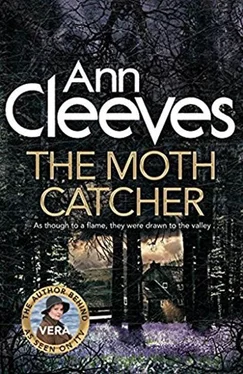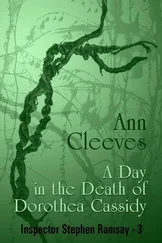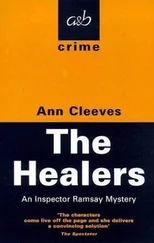At the door Holly stopped for a moment and turned to Jack Hewarth. ‘You still can’t remember why Patrick Randle’s name seems familiar?’
‘Sorry. I have been trying. But the more I think about it, the further away it slips.’
‘If you do, will you give me a ring?’
‘Sure.’ But he seemed disengaged again and she could tell he had no hope of the memory returning.
At mid-morning the weather started to change and a blustery wind from the west made it feel like spring instead of summer. Joe had tracked down the chairman of the trustees of Hope North-East and had arranged to meet him. He’d stuck his head into Vera’s office before setting off and had found her in a philosophical mood. She got that way sometimes.
‘This case is full of people worried about dying.’ She’d leaned towards him, her eyes gleaming as if she was fascinated by death, not worried by it. ‘They can feel their time running out. The murders must have made the fear more real. Daft, isn’t it? We’ve all got to go sometime.’
Joe wondered how he’d respond to news that he had a terminal illness. He didn’t think he’d be able to keep it secret. He’d even like the fuss and attention. And it might be exciting to be so close to death. He’d be reckless for the first time in his life. Drink too much. Take risks.
‘Perhaps fear in the abstract is worse than facing the immediate reality.’ Vera had still seemed preoccupied by morbid thoughts, but her voice had been cheerful. She probably wasn’t afraid of anything. Joe hadn’t bothered answering.
Hope’s chair of trustees was a labour councillor and former union man. He lived in a miners’ welfare cottage on the outskirts of Bebington. Joe knew of him through his father. They’d been comrades-in-arms, the same post-war generation. John Laidlaw had been a kind of hero in their family. The cottage was neat, the garden tended. A handrail had been fixed close to the front door, and through the window Joe saw an elderly woman sitting with a piece of embroidery on her knee, a walking frame propped beside her. She seemed to be drowsing, but the man who opened the door was spry and fit and looked younger than his wife.
‘You’ll be Bobby Ashworth’s son. This is a terrible business. Come into the kitchen, so we don’t disturb Doreen. She had a stroke last year and hasn’t been herself since.’
John Laidlaw was dressed in his Sunday best, shirt and tie and shining shoes. Joe thought he’d probably just come back from chapel. They sat on plastic chairs across a Formica table.
‘Shirley Hewarth was the best thing that happened to Hope. I got to know her when I was a magistrate. I knew she wasn’t happy with the way the probation service was going. Nobody in their right mind would be…’ The last was thrown out as a challenge. The former miner still saw a police officer as a potential enemy. ‘I offered her the job as director. Never thought she’d accept.’ A quick grin. ‘Then we had to find the money to pay her.’
‘Why do you think she did accept?’ That had been bothering Joe since he’d first encountered the woman.
‘Because she had principles and a social conscience.’ To John Laidlaw the answer was obvious. ‘She knew people coming out of prison are more likely to reoffend without support.’
Joe remembered the woman he’d met, the glimpse of the lacy bra. He thought there’d been more to Shirley Hewarth than a social conscience.
‘What did she bring to your organization?’
‘A professional approach. Before that, we were a glorified self-help group. Ex-offenders providing advice for their mates. And I’d use my contacts to drag in some volunteers to run occasional sessions. It was more like a drop-in centre. It served to keep lads off the street, but not much more than that. Shirley knew her way round the funding system and managed to pull in pots of money from a variety of sources. That meant we could run training courses, evaluate the work we were doing, provide individual counselling to clients who needed it. Then, because we had some credibility, statutory agencies bought in our services.’ Laidlaw stopped for breath.
‘I take it you had the accounts properly audited?’
‘What are you suggesting, man?’ Laidlaw’s voice was quiet, but he was angry enough to bunch one hand into a fist on the table.
‘Two people involved in your organization have been killed. I’m trying to find a reason. If someone had been fiddling the books, that might provide a motive.’
‘Nobody’s been fiddling the books. We run that place on a shoestring. The people working there put in more than they took out. I know damn fine that Shirley worked double the hours she was contracted for.’ When Laidlaw spoke, Joe pictured his father preaching. Both men full of righteous indignation, fuelled by class resentment.
‘What about Martin Benton?’ Joe asked. ‘Did you know him?’
‘I was on the interview panel that appointed him for the temporary IT post. That was Shirley’s idea. She said they were wasting time on admin when they could be working face-to-face with clients. I saw him in the office a couple of times after that, but I never felt I knew him.’
‘He was your chosen candidate?’ Joe was finding the interview trickier than he’d expected. Laidlaw had years of experience as a local politician. Not giving a straight answer was wired into his DNA.
‘He seemed to work wonders in the place when he was on the short-term contract, and had the commitment to come back as a volunteer.’ Laidlaw frowned. ‘Besides, Shirley vouched for him and that was good enough for me.’
Joe wondered if Laidlaw had been distracted by the lacy bra too. If, in his later years, he’d seen the possibility of a different sort of life, one not restricted by Christian socialist morality. ‘But what did you think of Benton when you interviewed him?’
‘Why, he seemed a nondescript man,’ Laidlaw said. ‘No personality. As soon as he walked out of the door I’d forgotten what he looked like or how he’d answered his questions. But he was the best qualified and Shirley wanted him, so we gave him the post.’
‘When did you last see Shirley?’
‘About a fortnight ago. A trustees’ meeting.’ Laidlaw paused. ‘I had a call from her since, though. Friday lunchtime.’
Joe looked up sharply. ‘What was that about?’
‘She wanted to fix up a meeting. Nothing urgent, she said, but she could use some advice.’ Laidlaw paused again. ‘I felt flattered, you know. Usually she was dishing out advice, not asking for it.’
Joe thought there was the beginning of a pattern here. Shirley had set up a meeting with her ex-husband too. How had she thought these older men could help her?
Laidlaw was continuing. ‘I told her I was free that afternoon. Doreen has the Women’s Guild on a Friday afternoon, so I could call into the Hope office after I’d dropped her off at the chapel. But Shirley said she already had a meeting and could we make it early next week.’
‘Did she tell you who she planned to visit on Friday afternoon?’ Joe tried to keep his voice easy, but could hear the excitement in it.
Laidlaw was scathing. ‘Do you think I’m daft, lad? I’d worked out she might have arranged to meet her killer. If she’d given me more details, don’t you think I’d have told you?’
In the silence that followed Joe’s mobile rang, startling them both. Joe thought Laidlaw was more tense and nervy than he was letting on. He answered his phone. It was Vera, chirpy. ‘Can you get yourself back here? Billy Cartwright’s got some news.’
Driving back to the police station Joe found his mind wandering to the first time he’d met John Laidlaw. It had been at his grandfather’s funeral. His grandad had been ill for months: lung cancer, probably caused by smoking Capstan Full Strength tabs and spending his early years underground in the pit. Joe had been a young boy and could just remember the occasion. The chapel full of old men. John Laidlaw had done a reading. On the way to the crem, Joe had asked his father what it was like to be dead. ‘We can never know for sure,’ his father had said. ‘It’ll be everyone’s last big adventure.’ Even as a child Joe had been surprised. He’d heard his father preach about life in the hereafter and had expected something more positive. More certain.
Читать дальше












